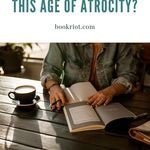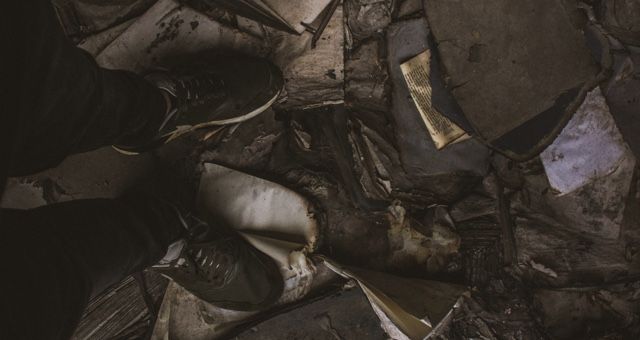I want to be as frank with you as is possible: it is increasingly hard for me to find joy or purpose in reading lately, specifically novels. I find myself asking, why read fiction at all when the world is falling apart around me?
In the United States, if you pay even moderate attention to the news, your Apple News app or NPR homepage are a blackhole of atrocity. Our country is currently operating concentration camps. There is a very plausible link between the President and an alleged serial child molester. In the past week, there have been a litany of climate change harbingers in our country, including intense flooding in Washington, D.C., and a heat wave in Alaska. These are but three examples of horrible things happening in our country, and on our planet, right now. I am a transgender, nonbinary person, whose identity has been a Trump administration target before. I easily envision a future in which the unchecked fascism of imprisoning asylum seekers without cause expands to include people like me, and others of any LGBTQIA+ identity, non-white ethnicity, neurodivergence, or disability. Stories like Epstein’s are a painful reminder, nearly two years after the #MeToo wave, that billionaires can get away with anything. I live in New York City, which will be swallowed in the floods of our rising oceans should climate change remain unchallenged. Not might—will. With all of this happening at the global, national, and personal level, my brain is constantly barraging itself with a firestorm of whys. Why continue to search for joy in a joyless time? Why continue to read books when these and innumerable other atrocities are taking place right now, right this very second, as I write this, and as you read it?
Joy
Well, there is certainly value in escapism. I cherish frivolous fun in these troubled times, and believe happiness for its own sake can be a vital act of resistance. Few things in this life have the potential to bring me pure joy like reading a pleasurable book. In the past few years, I have torn through and laughed shamelessly at the likes of Where’d You Go Bernadette. I’ve bitten my nails down to nubs while caroming with the twisting plots of Stephen King novels and short stories. This type of fiction is a vital reminder to a self-serious person like me that something doesn’t need to be profound to be intelligent, nor does a story have to be attempting to solve all the world’s problems to have merit. Whenever I reckon with the value of lightness, though, I inevitably return to a feeling of guilt. I worry that if I disengage from reality it becomes easier and easier to disengage for longer, more intense lengths of time. I worry that it misses the point of reading and writing fiction in the first place. The creeping why read fiction? hand is back around my throat.
Answers
When Donald Trump was elected President of the United States, George Orwell’s 1984 flew off the shelves, as readers looked to the dystopian classic to make some kind of sense of the near-dystopian mess we’d made for ourselves. It Can’t Happen Here experienced a resurgence too. Comparisons between Trump and Infinite Jest‘s President Gentle have rippled across the internet, and the temptation eternally remains to compare our pleasure-obsessed culture to Brave New World. Meanwhile, more contemporary novelists are engaging with the specters that loom over us today. “Cli-Fi,” for “climate change fiction,” is now a traceable genre on Goodreads. The likes of Speak read with new rawness and urgency in the wake of #MeToo, and newer novels like Susan Choi’s Trust Exercise still unabashedly portray abuses of power and bodies. Books like these make me think the answer doesn’t lie in reading for joy, at least not always. When the joy won’t come, when the rebellious lightness passes and the adrenaline-stoking page turners and beach reads start to feel pointless, maybe I can remember that fiction writers have always been exceptionally good at one thing: reflecting the times in which they live. Whether it’s the writers like Fitzgerald and Dostoevsky, who revel in lashing their tongues at their society’s vapidity, or those who portray atrocity and pain without compromise, like Toni Morrison and Marlon James, all of my favorite novelists concern themselves with putting a magnifying glass to their worlds. Despite all other doubt, I can connect to the endeavor of writing fiction as an attempt to sort out the bullshit of reality. The Great Gatsby, The Idiot, The Bluest Eye, and A Brief History of Seven Killings are not perfect analogues for our real world, but if nothing else, the intentions behind their writing can be.
Conclusion, Lack Thereof
We’re reaching the end of the essay, and I’ll remind you now, even if I’m coming temptingly close to a declaration here, that I still don’t have an answer. I don’t want to be someone whom this age of atrocity robs of their joy, and consequently a vital piece of their humanity. But neither do I want to be someone who holds so tightly to such a conviction that I lose sight of how dire our world’s problems are, instead always prioritizing the temporal comfort of my own pleasure. Fiction has given me a great deal of joy. Similarly, it’s given me insights into both the age in which I live and history, as it is uniquely equipped to do. In rare, sublime moments, single pieces of fiction have managed to do both simultaneously. When reading fiction fails to provide either joy or insight, I’m left with nothing but the whys. Why read fiction now? Why read fiction ever? It is possible that the why is the point, that to approach reading fiction with the expectation of an easy answer is folly. In the face of the whys, the best I can offer are not answers, but suggestions, grasps at purpose, from beneath waves of anxiety and existential dread.

